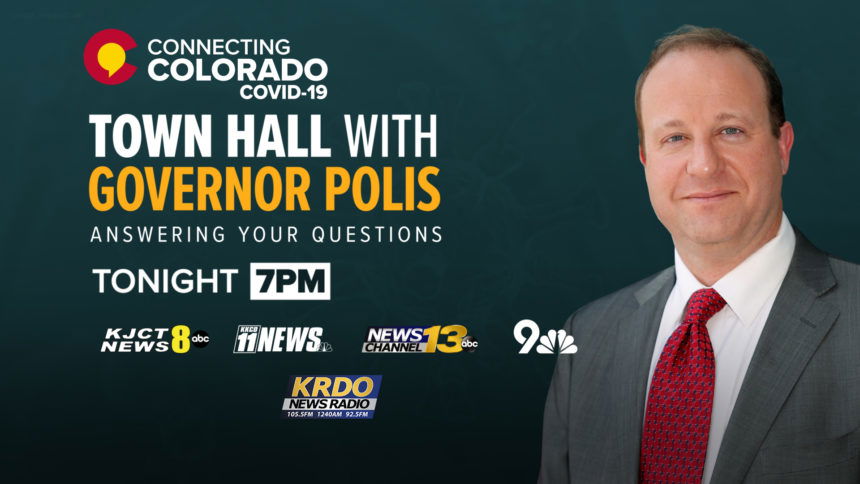Gov. Jared Polis answers your questions during COVID-19 town hall

DENVER (KRDO) -- Businesses have shut down and people across the country have had their ways of life upended by the spread of COVID-19, leading to many questions and feelings of uncertainty; Tuesday night, we're sitting down with Colorado Gov. Jared Polis to answer your questions amid the coronavirus pandemic.
The town hall meeting is being hosted by 9News' Kyle Clark and will start shortly before 7 p.m. We've been taking your questions since last week, and Gov. Polis will provide his insight throughout the hour.
Watch below, courtesy of our partners at 9News:
Polis was joined by Dr. Rachel Hirlehy to answer medical questions and Director of Economic Development Betsy Markey to field the economy questions.
Here are a few of the questions and answers from the town hall:
Kaz Hashigami (Denver): How do you know if you’re not passing the virus if you’re asymptomatic? Should asymptomatic people get tested?
Polis: If you’re experiencing COVID-like symptoms AND if you don’t need medical attention, don’t try to get tested. Stay home. If you’re having trouble breathing, then seek medical attention.
Katie Markman (Parker): Will Colorado have enough ventilators if the projected increase in some models proves true?
Polis: We’ve bought the time that we need through social distancing. As long as people stay at home we should have enough. Early data shows that the number of cases is increasing at a much lower rate now.
Kyle Clark: Where are we percentage-wise with the degree of social distancing?
Dr. Hirlehy: we achieved 45% social distancing with early strategies, in the next couple days we’ll get new numbers. We’re anticipating it will be between 60 and 80%.
Michael Breband (Centennial): At what point does the stay at home order give more damage to society than the virus itself?
Betsy Markey: The best thing we can do is get through the virus first. The worst thing would be to open too soon and then backslide.
CJ Dickinson (Arvada): When the stay at home order is lifted, when does normal begin again?
Polis: Complete normal, in terms of stadiums full of people, needs a cure or vaccine. But as far as opening the economy, it might mean that restaurants might have to have half capacity for a few extra weeks. We want to make sure not to open too much too soon which could lead to another surge.
Laurie Ann Mills (Denver): When will you address a rent freeze or a waiver on working class people?
Polis: There are not enforcement orders to force people to pay rent for at least 30 days, no one is being evicted. If you are, let authorities know.
Elizebeth Johnson (Longmont): Is there a test to find out if you’ve already had COVID-19?
Dr. Hirlehy: There are blood tests where we can determine if you’ve had it in the past. That could help us learn about the level of immunity. But right now we’re focused on testing symptomatic individuals.
David (Grand Junction): What measures are being taken to help protect inmates/staff from COVID?
Polis: There hasn’t been as many inmates being transferred between prisons, and prison blocks are maintaining more separation from other blocks in the population.
Kyle: Have you considered releasing non-violent offenders to reduce numbers in the prison system, such as was done in California?
Polis: In some cases there have been accelerated parole timelines if inmates were waiting to go on parole. We’ve been able to open up enough space to allow inmates to be more isolated from one another.
As of Wednesday, more than 5,400 people in Colorado have tested positive for coronavirus. You can find updated COVID-19 statistics from the state by clicking this link here.
